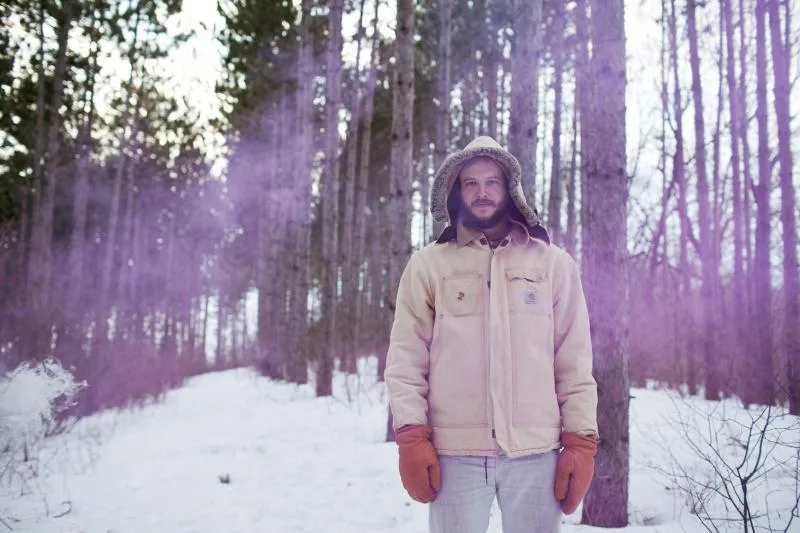
Nathaniel Frank, owner of MToxins Venom Lab in Oshkosh, demonstrates how he extracts venom from an eastern diamondback rattlesnake. (Photo by Christina Lieffring)
MToxins Venom Lab delights visitors while helping to save lives across the world.
Nathaniel Frank, owner of MToxins Venom Lab in Oshkosh, opens a container holding a very unhappy and deadly cobra. Using a hook he pins down the back of its head, grabs it right behind the jaw hinge with his hand, and pushes the fangs—swollen with venom—through a membrane over a vial, extracting the venom. He then returns the snake to its home, all within 40 seconds.
It’s a skill he regularly practices and often lets visitors observe—but only behind a thick panel of glass.
Frank has been extracting venom from snakes for over a decade. He got started because he was the only person in the US who owned a Malaysian blue coral snake and some researchers asked if he could send them venom samples.
He found a mentor to show him the ropes and it grew from there.
“I was just a 6-year-old kid that was obsessed with dinosaurs and reptiles and it stayed with me my entire life,” Frank said.
Now he extracts venom from 1,100 snakes and scorpions. Some of it is shipped to companies that make antivenom to treat venomous snake bites around the world and some to venom researchers.
MToxins is also open to the public on weekends with over 60 different animals on display, including snakes, turtles/tortoises, a bald eagle, a parrot, and other animals undergoing rehabilitation. The business also holds conservation classes for children.
When asked what his 6-year-old self would think of his life right now, Frank said, “I don’t think that six year old kid could believe it, to be quite honest.”
Thrice bitten, Not Shy
Here’s what happens when someone is bitten by a black mamba: just two drops of its venom can kill a human, as it contains neurotoxins that quickly shut down the victim’s nervous system, paralyzing them. One human died 20 minutes after being bitten, but in most cases it can take from 30 minutes to three hours.
One South African woman who survived a black mamba bite said that she “felt a terrible burning, like pins and needles…”
“It felt like my blood was boiling,” she told a South African news channel. “The pain was radiating up my leg; I was battling to breathe and started feeling weak.”
Frank has experienced the pain for himself.
In the 11 years he’s been extracting venom he has been bitten three times. The most recent incident, in September, 2020, was a black mamba.
“My upper respiratory system was starting to shut down, I lost the ability to talk, I couldn’t control my tongue, couldn’t control my eyelids,” he said. “That’s just it breaking down neurologically and eventually you lose the ability to breathe.”
RELATED: Wisconsin’s 15 Weirdest News Stories of 2021
MToxins has antivenom for all it’s animals on-hand in case of an incident. Once it was administered, Frank went to the hospital, where protocols have been prepared in advance.
“That’s an inevitability,” Frank said. “It’s going to happen when you’re working with dangerous animals. You know, eventually there’s gonna be an accident. So preparedness is key.”
The black mamba that bit him is now on display and no longer used for venom extraction. It has also been enshrined in ink on Frank’s forearm, along with the other two snakes that have bitten him, a fer-de-lance and a stiletto snake.
“It’s a reminder—a constant reminder—to pay attention, focus, slow down,” he said.
Worth The Risk
Given how frequently he handles the snakes, three bites in 11 years is a decent track record. But why take the risk?
MToxins specializes in venomous snakes from Asia, Africa, and South America, regions that are underserved and where snake bites are a significant public health concern.The World Health Organization reports that 1.8 to 2.7 million people are poisoned every year by venomous snakes, resulting in up to 137,880 deaths and three times as many amputations and permanent disabilities.
Franks has traveled to areas across Africa with a nonprofit to provide snake bite training and clinics.
“I’ve gotten to see our antivenom save people’s lives in their native country,” Frank said. “It’s the saving of lives that keeps me doing the work and, and taking the risk each day, knowing that we’re making a difference through that work and getting to see it in person.”
He also loves seeing the reaction of the public—to the animals, the conservation lessons , and to seeing him handle the snakes.“It’s wonderful to watch everyone’s faces while we’re working with the animals,” Frank said. ”It really instills a sense of awe for people when they watch this process. And for us it’s work, it’s our job. But it brings a lot of joy to a lot of people to be able to watch us do this.”
Politics

Biden cancels student loan debt for 3,940 more Wisconsinites
The Biden administration on Friday announced its cancellation of an additional $7.4 billion in student debt for 277,000 borrowers, including 3,940...

The Republican war on Medicare raises the stakes in 2024
Nearly 1.3 million Wisconsinites rely on Medicare benefits—benefits they spent decades paying into, with the promise that the program would be there...
Local News

Your guide to the 2024 Blue Ox Music Festival in Eau Claire
Eau Claire and art go hand in hand. The city is home to a multitude of sculptures, murals, and music events — including several annual showcases,...

Where to buy farm-fresh eggs in western Wisconsin
There’s nothing better than eggs from a local farm. Of course, they taste fresher and last longer, but the best part is that you’re supporting a...




